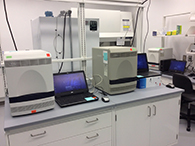K-State begins offering COVID-19 testing for university students, employees
Tuesday, April 28, 2020
MANHATTAN — As the coronavirus pandemic continues, Kansas State University is helping combat the virus by developing important diagnostic tests and offering testing services for the university community.
The university is now able to test K-State students, faculty and staff who need testing either because they are ill and have COVID-19 symptoms or because they have been exposed to someone with the virus. The Kansas Department of Health and Environment has asked K-State to ramp up human testing and researchers are increasing their testing capacity.
The testing is a partnership than involves more than 20 faculty and staff from the Kansas State Veterinary Diagnostic Laboratory, the Biosecurity Research Institute in Pat Roberts Hall, Lafene Health Center, the College of Veterinary Medicine and the Center of Excellence for Emerging and Zoonotic Animal Diseases. The collaborative team worked tirelessly through setbacks to make testing at K-State a possibility.
"This demonstrates how critical investments in research can serve the greater community — that's our land-grant mission," said Peter K. Dorhout, K-State vice president for research. "The team was able to mobilize and stand up a first-rate facility to ease pressures on the health care community and provide test analyses because they are part of the National Animal Health Laboratory Network that has trained and prepared to respond to animal and zoonotic disease outbreaks."
Students, faculty and staff can be tested at Lafene Health Center, and then testing samples are sent to the Kansas State Veterinary Diagnostic Laboratory, or KSVDL, for analysis. The laboratory has moved personnel, molecular equipment and computers into the Biosecurity Research Institute, or BRI, to conduct the analysis.
"Because of planning and preparation with the BRI over the last few years concerning foreign animal disease, as part of the National Animal Health Laboratory Network, KSVDL was able to respond quickly to the request to assist with human pandemic testing," said Jamie Henningson, KSVDL director.
For now, the testing is on a case-by-case basis and is only available for K-State students, faculty and staff. K-Staters should call their primary physician or Lafene Health Center at 785-532-6544 before they visit the health center. After a phone discussion, if testing is warranted, Lafene Health Center is able to see the patients.
The testing schedule is set up for 12 hours per day, which will allow the laboratory to perform about 270 tests each day. The university currently is not able to do wide-scale testing, called surveillance testing, but researchers are working through logistics to make the testing available to a wider community beyond K-State students, faculty and staff. The 270 tests per day is in addition to KSVDL’s maintenance of normal testing to support animal agriculture, companion animal testing, rabies diagnostics and zoos.
Having the testing capability at K-State is a step in the right direction, said Kyle Goerl, medical director for Lafene Health Center.
"Fortunately, with testing now being possible in town, the turnaround time is also much faster, which allows us to make more timely decisions for patient care," Goerl said. "Testing is important, but it is only one part of a comprehensive plan for any patient. Providers still need to consider the whole picture when making decisions about treatment for a patient."
The process of bringing testing to K-State involved many collaborators. Lafene Health Center, the Biosecurity Research Institute and the Kansas State Veterinary Diagnostic Laboratory reached out to other diagnostic laboratories to see how other people were handling the testing process.
The Biosecurity Research Institute, or BRI, lab is an advantage because it already has the high-security laboratories, equipment and expertise required for COVID-19 testing. The BRI is a biosafety level-3 facility that houses important multidisciplinary research programs on pathogens that affect animals, plants and insects as well as food safety and security. The BRI is one of the few labs of its kind in the nation.
The K-State collaborators worked to ensure regulation and adequate oversight for the COVID-19 testing. All laboratory staff have been trained on the new test and all laboratory space and procedures follow Clinical Laboratory Improvement Amendments, or CLIA, requirements. The KSVDL rabies laboratory is CLIA certified, which involves federal regulatory standards required for all labs performing human testing. Laboratory staff have completed HIPAA training, too.
KSVDL also has developed a faster COVID-19 modified CDC polymerase chain reaction, or PCR, test, which detects the presence of an antigen earlier to determine if a person has the virus. Researchers have submitted an Emergency Use Authorization for Food and Drug Administration approval. The approval makes diagnostic tools available during public health emergencies. If the laboratory receives FDA approval, it would allow the laboratory to ramp up testing even further.
"I am extremely proud of the work it took to bring this into reality," Goerl said. "We have amazing, caring people here at K-State and this would not be possible without them. There were multiple times we could have simply given up due to one problem or another, but despite all the setbacks, we found a way forward."


